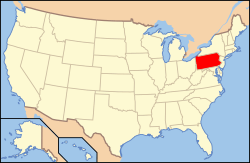Jersey Shore Historic District
The Jersey Shore Historic District is a national historic district located in Jersey Shore, Lycoming County, Pennsylvania.[2] The district encompasses 286 contributing buildings in the central business district and surrounding residential area of Jersey Shore. Most were built during the period 1830 to 1860, and are representative of Victorian, Greek Revival, and Federal style architecture.
Jersey Shore Historic District | |
Jersey Shore Historic District, June 2009 | |
 Location in Pennsylvania  Location in United States | |
| Location | Irregular shape roughly bounded by Lawshe Run, W. Branch Susquehanna River, S borough boundaries, and Tomb Ave., Jersey Shore, Pennsylvania |
|---|---|
| Coordinates | 41°12′4″N 77°15′18″W |
| Area | 150 acres (61 ha) |
| Built by | Alexander Smith (Humes building) |
| Architectural style | Late Victorian, Greek Revival, Federal |
| NRHP reference No. | 75001653[1] |
| Added to NRHP | March 31, 1975 |
It was added to the National Register of Historic Places in 1975.[1][3]
History
The Borough of Jersey Shore had its beginnings in pre-Revolutionary War days, according to newspaper accounts of the town's history.[4]
Dean R. Wagner, who prepared the form which helped secure the Jersey Shore Historic District's placement on the National Register of Historic Places, the present day Borough of Jersey Shore, Pennsylvania confirmed in 1975 that the town is located on lands which were part of initial land grants made to 17th and 18th-century settlers along the western branch of the Susquehanna River, roughly 15 miles south of what is, today, the city of Williamsport in Lycoming County. Those land grants, from north to south, were: Forrest Situate, Richmond Situate, Richland Situate, and Forge Hammer. A portion of Forrest Situate was then subsequently purchased by Jeremiah and Reuben Manning who, sometime around the year 1800, had left the shore of New Jersey where they were residing to relocate to Pennsylvania. After purchasing their land, they then laid out a town north of what is, today, Allegheny Street, and initially named their new town Waynesburg. That year, there were just four houses inside the town's boundaries, but the town was ripe for expansion because there were multiple businesses located outside of town, including lumber and flour mills.[5]
Twelve years later, William B. Smith purchased land south of what is now Allegheny Street, and laid out a new section of town there in 1813. Initially reachable by wagon and stagecoach, the town became even more accessible when it became a stop on the West Branch Canal in 1834. Further growth was impeded during the mid-1800s, however, when planners chose to build the incoming railroad on the other side of the river, rather than closer to or through the town.[5]
The name of the town was officially changed to Jersey Shore in 1826.[6]
This historic district was added to the National Register of Historic Places in 1975.[1][7]
Notable architecture
Notable buildings include:
- Abraham Lawshe House (c. 1840),[8] which was the home of the owner of Jersey Shore's largest tannery
- Gallagher-Webb House (c. 1842)
- Mark Slonaker House (c. 1845), which was the home of one of the men who collaborated on the construction of a pig iron furnace on the Upper Pine Bottom Run in 1814[9]
- Stone-Nice House (c. 1845)
- Bailey-Allen House (c. 1850)
- Sanderson-Sebring House (c. 1852)
- Samuel Humes Building (1852), which was named in honor of a member of the board of directors of both the Jersey Shore National Bank and the Lewisburg Turnpike and Bridge Company[10]
- Moran-Trump House (1855)
- West Branch Dormitory Building (1856)
- McHenry-Cline House (c. 1885).[5]
References
- "National Register Information System". National Register of Historic Places. National Park Service. July 9, 2010.
- "Jersey Shore Historic District," in "PENNSYLVANIA: Lycoming County." Washington, D.C.: National Register of Historic Places, retrieved online September 18, 2019.
- "The Comprehensive Plan Background Studies for the US 220/Future I-99 Planning Area" (final draft), p. 108. Lycoming County, Pennsylvania: Jersey Shore Borough, Piatt Township, Porter Township, Woodward Township, February 2003.
- Barnes, Tom. "Jersey Shore, Pennsylvania has plenty to offer except sand and surf." Pittsburgh, Pennsylvania: Pittsburgh Post Gazette, October 7, 2012.
- "National Historic Landmarks & National Register of Historic Places in Pennsylvania" (Searchable database). CRGIS: Cultural Resources Geographic Information System. Note: This includes Dean R. Wagner (May 1974). "National Register of Historic Places Inventory Nomination Form: Jersey Shore Historic District" (PDF). Retrieved 2011-11-19.
- Grundhauser, Eric. "Why There's a Jersey Shore in the Middle of Pennsylvania." Atlas Obscura, August 15, 2017.
- "The Comprehensive Plan Background Studies for the US 220/Future I-99 Planning Area," p. 108, Jersey Shore Borough, et. al.
- Meginness, John Franklin, ed. History of Lycoming County, Pennsylvania, p. 486. Chicago, Illinois: Brown, Runk & Co., Publishers, 1892.
- Megenness, History of Lycoming County, p. 685.
- Meginness, History of Lycoming County, p. 1044.

